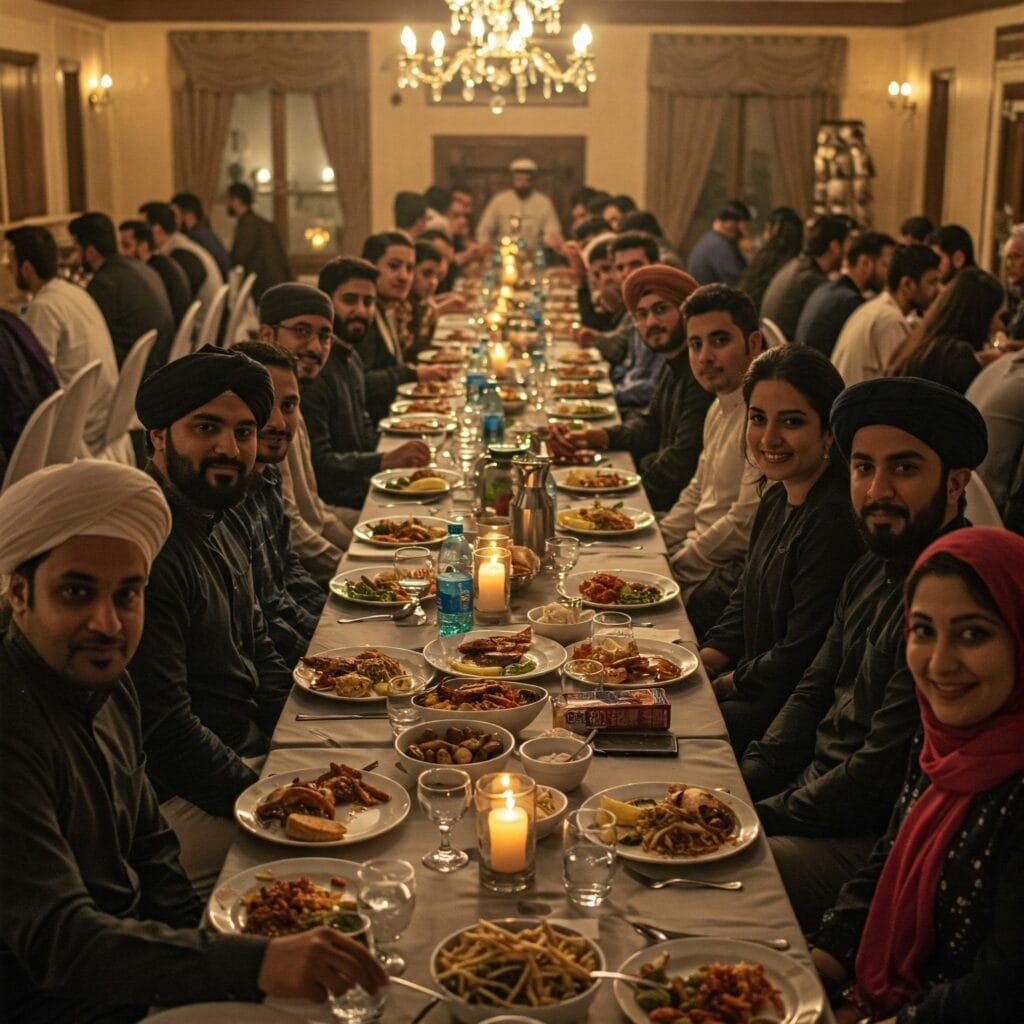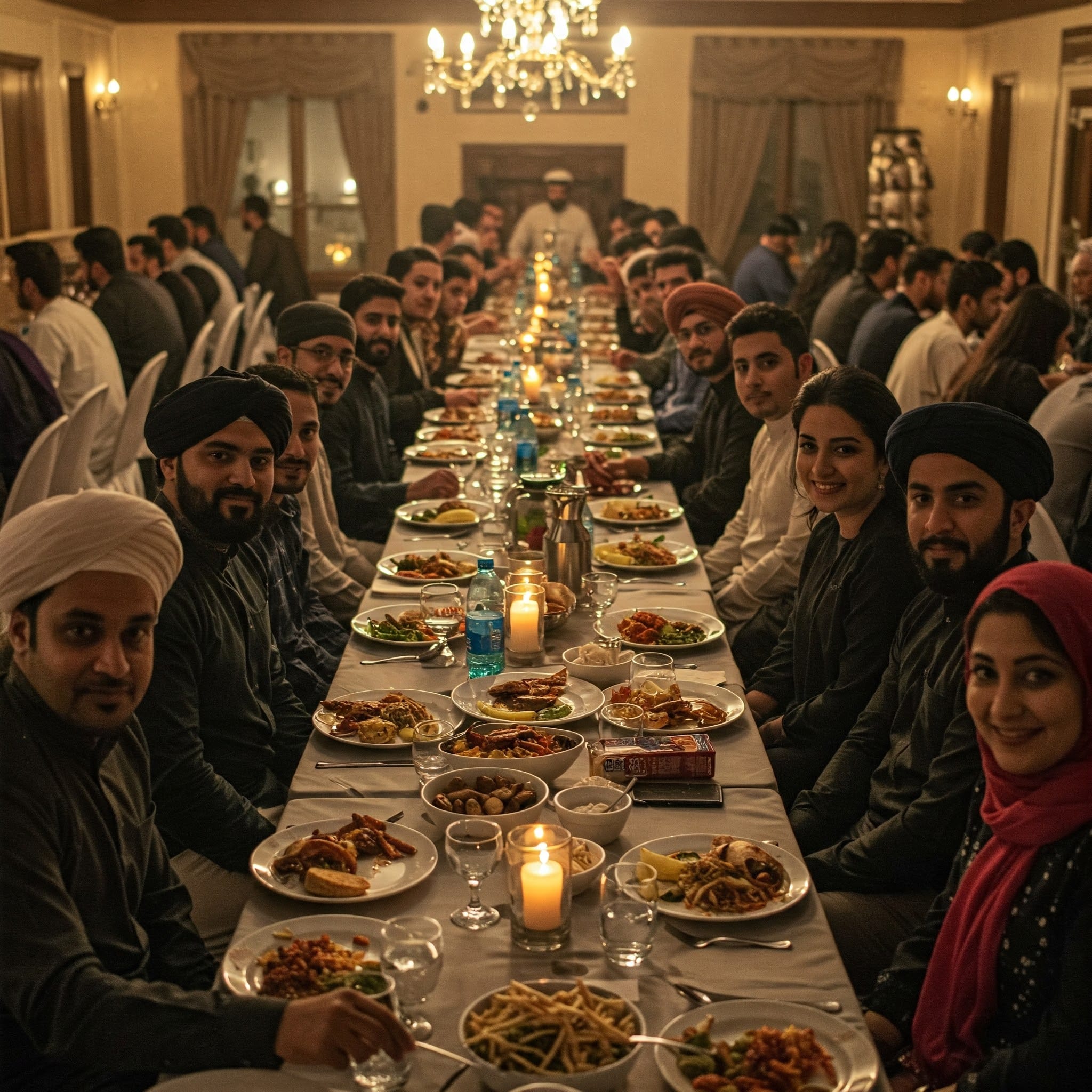Ramadan, the ninth month of the Islamic lunar calendar, is a sacred time for over 1.9 billion Muslims, characterized by fasting, prayer, and spiritual renewal as ordained by the Quran. Among its cherished traditions, community iftar—the collective breaking of the fast at sunset—stands out as a powerful expression of brotherhood, unity, and shared devotion. Rooted in Quranic teachings and the Sunnah of the Prophet Muhammad (peace be upon him), community iftars transcend cultural and social boundaries, fostering bonds of ukhuwwah (brotherhood) and reinforcing the ummah’s (Muslim community’s) cohesion. In 2025, as globalization and digital connectivity shape social interactions, community iftars remain a vital practice for building empathy, solidarity, and spiritual growth. This in-depth article explores the role of community iftar in nurturing brotherhood and unity, weaving theological foundations, prophetic examples, practical benefits, and contemporary contexts. By addressing challenges, clarifying misconceptions, and offering actionable steps, we aim to highlight how this tradition strengthens the fabric of Muslim communities worldwide.

Theological Foundations of Community Iftar
Quranic Emphasis on Unity
The Quran underscores the importance of communal bonds and cooperation:
“And hold firmly to the rope of Allah all together and do not become divided…” [Aal-E-Imran 3:103]
This verse calls for unity, which community iftars embody by bringing Muslims together in worship and fellowship. Another verse promotes collective righteousness:
“And cooperate in righteousness and piety, but do not cooperate in sin and aggression…” [Al-Ma’idah 5:2]
Sharing iftar aligns with this directive, fostering mutual support and taqwa (God-consciousness).
Charity and Generosity
The Quran links Ramadan with acts of giving:
“…And whatever good you put forward for yourselves—you will find it with Allah. It is better and greater in reward…” [Al-Baqarah 2:110]
Community iftars, often provided for the needy, reflect this principle, ensuring inclusivity and spiritual reward.
Fasting’s Communal Purpose
The Quran frames fasting as a means to righteousness:
“O you who have believed, decreed upon you is fasting as it was decreed upon those before you that you may become righteous.” [Al-Baqarah 2:183]
Community iftars enhance taqwa by combining fasting’s discipline with shared joy, strengthening communal faith.
Prophetic Practices and Community Iftar
The Prophet Muhammad (peace be upon him) modeled communal breaking of the fast, emphasizing its role in fostering brotherhood:
- Sharing Iftar: He said, “Whoever provides iftar for a fasting person has a reward like his, without detracting from the fasting person’s reward” [Jami’ at-Tirmidhi 807]. This encouraged collective meals.
- Simplicity and Inclusivity: He broke his fast modestly with dates and water, often with companions (Sahih al-Bukhari 1957), welcoming all, regardless of status.
- Mosque Gatherings: He led communal prayers post-iftar, like taraweeh (Sahih al-Bukhari 1905), uniting the ummah in worship.
These practices inspire modern community iftars, blending generosity with spiritual unity.
The Role of Community Iftar in Building Brotherhood and Unity
1. Fostering Brotherhood (Ukhuwwah)
Community iftars create spaces for Muslims to connect, reflecting Aal-E-Imran 3:103’s call for unity:
- Shared Experience: Breaking the fast together, often with dates as per Sahih al-Bukhari 1957, bonds participants through a shared act of worship.
- Empathy and Support: Conversations over iftar allow individuals to share struggles, fostering mutual care, per Al-Ma’idah 5:2.
- Inclusivity: Iftars welcome diverse groups—rich, poor, locals, and immigrants—embodying Al-Hujurat 49:13’s emphasis on equality.
Impact: These gatherings strengthen ukhuwwah, creating lasting relationships that extend beyond Ramadan.
2. Promoting Unity Across Diversity
Community iftars bridge cultural and social divides, per Al-Hujurat 49:13:
- Cultural Exchange: Dishes from various cuisines—biryani, harira, or sambusas—celebrate diversity while uniting over faith.
- Interfaith Outreach: Open iftars, especially in Western countries, invite non-Muslims, fostering mutual understanding, per Al-Hujurat 49:13.
- Breaking Barriers: Iftars in mosques or public spaces dissolve class, race, or sectarian divides, reinforcing the ummah’s cohesion.
Impact: Unity is reinforced, countering division and promoting a global Muslim identity.
3. Encouraging Generosity and Charity
Iftars often include free meals for the needy, aligning with Al-Baqarah 2:110:
- Sadaqah in Action: Organizers and attendees donate food or funds, per Jami’ at-Tirmidhi 807, ensuring all can break their fast.
- Community Effort: Volunteers prepare and serve meals, reflecting Al-Ma’idah 5:2’s cooperation in righteousness.
- Spiritual Reward: Providing iftar multiplies blessings, per Jami’ at-Tirmidhi 807, motivating generosity.
Impact: Charity strengthens communal bonds, ensuring inclusivity and spiritual growth.
4. Strengthening Spiritual Connection
Iftars are often followed by taraweeh or dua, per Sahih al-Bukhari 1905:
- Collective Worship: Group prayers post-iftar deepen iman, aligning with Al-Baqarah 2:183’s goal of taqwa.
- Shared Dua: Reciting supplications, like “Allahumma innaka ‘afuwwun…” (Sunan Ibn Majah 3850), unites hearts in seeking Allah’s mercy.
- Quranic Reflection: Iftars often include short tafsir sessions, per Al-Baqarah 2:185, enhancing spiritual awareness.
Impact: Spiritual unity reinforces faith, making iftars a holistic act of devotion.
Practical Benefits of Community Iftar
- Social Cohesion: Iftars combat isolation, per Al-Ma’idah 5:2, fostering friendships and support networks.
- Emotional Well-Being: Shared meals and dua, per Ar-Ra’d 13:28, reduce stress and promote sakina (tranquility).
- Cultural Preservation: Traditional dishes and customs, per Al-Hujurat 49:13, maintain heritage while uniting diverse groups.
- Interfaith Harmony: Open iftars dispel misconceptions about Islam, per Al-Hujurat 49:13, building community goodwill.
Contemporary Contexts in 2025
Global Practices
- Urban Iftars: Cities like London, Dubai, and Kuala Lumpur host public iftars, like Trafalgar Square’s event, uniting thousands, per Al-Ma’idah 5:2.
- Digital Coordination: Apps like Muslim Pro and Ramadan Legacy connect volunteers and attendees, streamlining iftar planning, per Al-Baqarah 2:185.
- Interfaith Iftars: Mosques in the US and Canada invite non-Muslims, per Al-Hujurat 49:13, fostering dialogue, as seen in Dearborn’s potlucks.
- Sustainable Iftars: Eco-friendly events in Malaysia and the UK use biodegradable plates, reflecting Al-Baqarah 2:205’s care for the earth.
- Charity Drives: Organizations like Islamic Relief fund iftars for refugees, per Al-Baqarah 2:110, ensuring global inclusivity.
Challenges
- Commercialization: Lavish iftars in some regions contradict the Prophet’s simplicity (Sahih al-Bukhari 1957). Scholars via IslamQA advocate modesty.
- Logistical Issues: Large iftars face funding or space constraints. Digital platforms and community donations, per Al-Ma’idah 5:2, address this.
- Cultural Divides: Sectarian or ethnic differences can fragment iftars. Inclusive events, per Al-Hujurat 49:13, promote unity.
- Post-Ramadan Continuity: Maintaining iftar’s bonds year-round is challenging. Regular community events, per Aal-E-Imran 3:103, sustain unity.
Common Misconceptions and Clarifications
Misconception 1: Community Iftar Is Just a Meal
Myth: Iftar is solely about eating. Clarification: Per Al-Baqarah 2:183, iftar combines worship, charity, and unity, as the Prophet’s shared meals show (Jami’ at-Tirmidhi 807).
Misconception 2: Iftars Exclude Non-Muslims
Myth: Community iftars are for Muslims only. Clarification: Open iftars, per Al-Hujurat 49:13, welcome all, fostering interfaith harmony, as seen in global practices.
Misconception 3: Iftars Are Culturally Uniform
Myth: All iftars follow one tradition. Clarification: Al-Hujurat 49:13 celebrates diversity, with iftars featuring varied cuisines and customs, united by Al-Ma’idah 5:2’s righteousness.
Misconception 4: Organizing Iftars Is Too Complex
Myth: Community iftars require excessive resources. Clarification: Small, modest iftars, per Sahih al-Bukhari 1957, are effective, supported by apps and volunteers, per Al-Ma’idah 5:2.
Practical Steps to Organize and Participate in Community Iftar
To foster brotherhood and unity through community iftar:
- Plan Inclusive Iftars: Host events at mosques or parks, inviting diverse groups, per Al-Hujurat 49:13. Use Muslim Pro for coordination.
- Keep It Simple: Serve modest meals, like dates and water, per Sahih al-Bukhari 1957, ensuring accessibility.
- Involve Volunteers: Assign roles—cooking, serving, or cleanup—per Al-Ma’idah 5:2, fostering teamwork.
- Fundraise for the Needy: Collect donations via Zakatify for free iftars, per Al-Baqarah 2:110, ensuring inclusivity.
- Incorporate Worship: Follow iftar with taraweeh or dua, per Sahih al-Bukhari 1905, deepening spiritual unity.
- Invite Non-Muslims: Host open iftars, per Al-Hujurat 49:13, to educate and build bridges, as seen in the UK.
- Promote Sustainability: Use eco-friendly supplies, per Al-Baqarah 2:205, following Malaysia’s model.
- Sustain Connections: Organize post-Ramadan gatherings, per Aal-E-Imran 3:103, to maintain iftar’s bonds.
Conclusion
Community iftar is a cornerstone of Ramadan, weaving together fasting, charity, and worship to build brotherhood and unity, as called for in Aal-E-Imran 3:103 and Al-Ma’idah 5:2. Rooted in the Quran and the Prophet’s practices, like sharing modest meals (Sahih al-Bukhari 1957), iftars foster ukhuwwah, bridge divides, and promote generosity. In 2025, global practices—public iftars, interfaith events, and digital coordination—amplify their impact, despite challenges like commercialization. By organizing inclusive, sustainable iftars, Muslims can strengthen the ummah’s cohesion, fulfilling the Quranic vision:
“Indeed, this ummah of yours is one ummah, and I am your Lord, so worship Me.” [Al-Anbiya 21:92]
Must read:
- Conquer the Post-Ramadan Blues: Unleash Vibrant Spirituality to Sustain Momentum After Eid!
- Unlock the Joyful Secret: Ramadan’s Spirit Ignites Lasting Faith in Your Kids!
- Unlock the Transformative Secret: Ramadan’s Faith Ignites Unshakable Patience and Self-Control!
Frequently Asked Questions (FAQs)
u003cstrongu003eWhy are community iftars important?u003c/strongu003e
They foster ukhuwwah and unity, per Aal-E-Imran 3:103, through shared worship and charity, per Al-Ma’idah 5:2.
u003cstrongu003eCan non-Muslims attend iftars?u003c/strongu003e
Yes, open iftars, per Al-Hujurat 49:13, promote interfaith harmony, as seen in global events.
u003cstrongu003eHow do iftars build brotherhood?u003c/strongu003e
Shared meals, dua, and charity, per Jami’ at-Tirmidhi 807, create empathy and bonds, per Al-Ma’idah 5:2.
u003cstrongu003eAre lavish iftars acceptable?u003c/strongu003e
Modesty, per Sahih al-Bukhari 1957, is preferred, ensuring focus on taqwa, per Al-Baqarah 2:183.
u003cstrongu003eHow can I organize a community iftar?u003c/strongu003e
Plan simple meals, involve volunteers, and use apps like Muslim Pro, per Al-Ma’idah 5:2, for inclusivity.
u003cstrongu003eDo iftars sustain unity post-Ramadan?u003c/strongu003e
Yes, regular community events, per Aal-E-Imran 3:103, maintain bonds, building on iftar’s spirit.


Post Comment